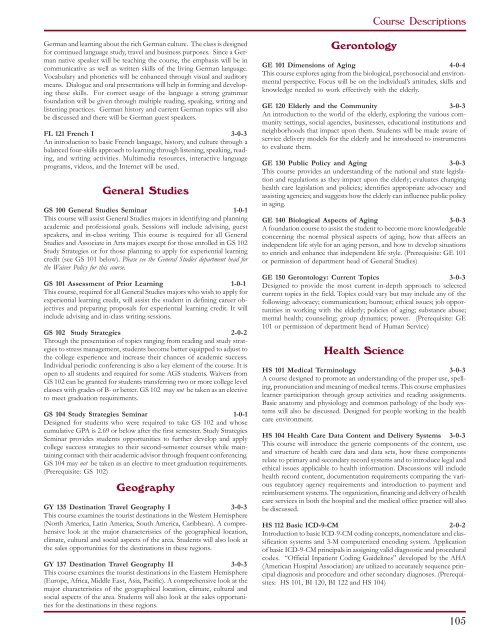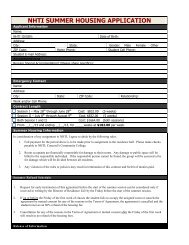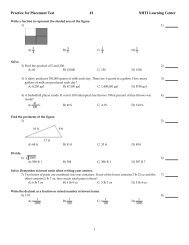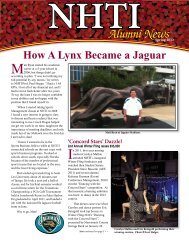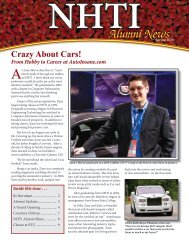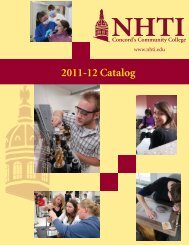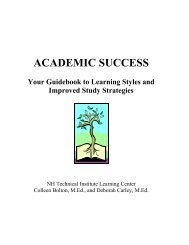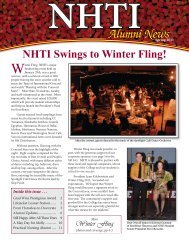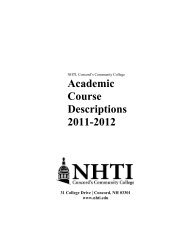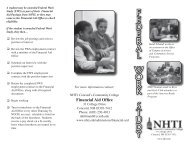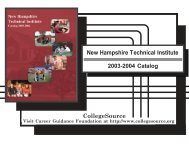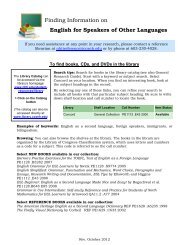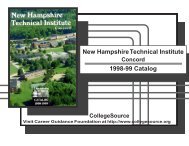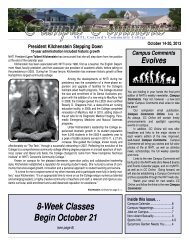Copyright & Disclaimer Information: Copyright © 1994, 1995, 1996, 1997, 1998, 1999, 2000, 2001, 2002, 2003, 2004, 20<strong>05</strong>, 20<strong>06</strong>, 2007. <strong>College</strong>Source®, Inc. and Career Guidance Foundation. <strong>College</strong>Source® digital catalogs are derivative works owned and copyrighted by <strong>College</strong>Source®, Inc. and Career Guidance Foundation. <strong>Catalog</strong> content is owned and copyrighted by the appropriate school. While <strong>College</strong>Source®, Inc. and Career Guidance Foundation provides information as a service to the public, copyright is retained on all digital catalogs.Copyright & Disclaimer Information: Copyright © 1994, 1995, 1996, 1997, 1998, 1999, 2000, 2001, 2002, 2003, 2004, 20<strong>05</strong>, 20<strong>06</strong>, 2007. <strong>College</strong>Source®, Inc. and Career Guidance Foundation. <strong>College</strong>Source® digital catalogs are derivative works owned and copyrighted by <strong>College</strong>Source®, Inc. and Career Guidance Foundation. <strong>Catalog</strong> content is owned and copyrighted by the appropriate school. While <strong>College</strong>Source®, Inc. and Career Guidance Foundation provides information as a service to the public, copyright is retained on all digital catalogs.Course Descriptionsartists to develop skills using tools and methods used to create functionalartwork throughout history.FA 125A Woodworking in the Hand Tool Tradition 2-4-4This course will focus on the skills and insights necessary to find beautifullyfunctional spoons in the tree and to extract them by techniquestraditional to the New England farm shed. Students must attend all ofthe first six classes, after which no more than two absences will beallowed without penalty. (KJCAS; studio fee)FA 130 Introduction to Photography 2-4-4This basic photography course is designed to familiarize the student withthe use and care of photographic equipment, a 35mm manual camera, aswell as developing and darkroom printing techniques. The assignmentsare designed to cover a variety of shooting situations, and the expectationis that the student will apply the elements of composition to and demonstrateproficient technical ability with expressive content in the makingof pictures. Students should expect to provide their own 35mm camera.(KJCAS; Studio Fee)FA 135 Introduction to Ceramics 2-4-4This introduction to ceramics will focus on studio work leading to thecompletion of five projects. Students will learn the basics of handbuilding,the potter’s wheel, kiln firing, glazing, and surface embellishment. Classtime will be made up of instructor’s demonstrations, group critiques, andindividual studio work. Projects will stress the sculptural potential ofclay with a visit into the aesthetic merit of functional vessel making. Aresearch project, introducing students to the work of contemporary clayartists, will provide inspiration and direction. (KJCAS; Studio Fee)FA 140 Introduction to Modern Dance 1-4-3This course is designed to guide students' knowledge and awareness ofthe performing art form that is Modern Dance through the study of thehistory of modern dance via assigned readings and viewings of videotapedperformances by various modern dance companies and through thephysical development of a basic movement vocabulary, elementary dancetechnique, improvisation exploration, and composition. Students mustwear fitted sweat pants, running pants or shorts, and fitted T-shirts or aleotard with footless tights or other dance/exercise clothing during classsessions. (This course will be taught at the Petit Papillon dance studio,which is a 10-15-minute drive from the <strong>NHTI</strong> campus. Students shouldplan their schedules to accommodate travel time. )FA 150 Introduction to Guitar 3-0-3This course offers a fundamental approach to learning the guitar forbeginning students with varied levels of experience. Students will beinvolved with and exposed to performance situations, some practicalapplications of music theory as well as different playing styles and techniques.Students must provide their own instruments. Acoustic instruments only.FA 201 Drawing II 2-4-4This advanced drawing class builds upon the aesthetic, technical, andconceptual foundation established in FA 101 (Introduction to Drawing).This observational drawing course will develop greater technical facilitywith materials and explore methods for translating and interpreting one’senvironment onto a drawing. As conceptual options and skill with materialsincrease, drawing will become a stronger outlet for personal andcreative expression. Students will expand their understanding and use ofcolor and work more extensively from the human figure. The historicalfoundation of drawing will be explored, as well as contemporary andhistorical trends. (Prerequisite: FA 101) (KJCAS; Studio Fee)FA 220 Painting II 2-4-4This course involves further development of skills and concepts coveredin FA 120 (Introduction to Oil Painting) while emphasizing individualexpression within the parameters of structured studio projects. This courseis intended to advance the student’s understanding of visual organizationand design through the development of a personal painting vocabulary.(Prerequisite: FA 120) (KJCAS; Studio Fee)Foreign LanguageFL 104 American Sign Language for Beginners 3-0-3This course will introduce students to basic knowledge and skills ofAmerican Sign Language. Students will achieve the beginning levels offluency in communicating through the use of ASL.FL 1<strong>05</strong> Advanced American Sign Language 3-0-3This course will teach students the advanced skills and knowledge ofAmerican Sign Language. Students will achieve fluency in communicatingthrough the use of ASL.FL 110 Elementary Japanese I 3-0-3An introduction to modern Japanese language and culture. Students canexpect to master basic reading and writing skills. Emphasis, however,will be placed on developing listening skills and speaking skills. A varietyof materials will be utilized to expose students to Japanese culture. Noprevious knowledge of Japanese required.FL 111 Elementary Spanish I 3-0-3A fully integrated introductory Spanish course. The course is designed forbeginning Spanish students whose learning objectives and needs are inany of the following categories: continued language study, business purposes,or travel. The emphasis is to develop proficiency in communicativeskills concentrating on the dynamic application of the living languagetaught through dialog, phonetics and vocabulary. A strong grammarfoundation and other basic language skills are taught through actualphrases and sentences, helping the student develop an instinctive sense ofthe correct usage. These objectives will be achieved through the followingapproaches: speaking, listening, reading, writing, and cultural studies.FL 112 Elementary Spanish II 3-0-3A fully integrated intermediate Spanish course. The course is designed forintermediate Spanish students whose learning objectives and needs are inany of the following categories: continued language study, businesspurposes, or travel. The emphasis is to consolidate and reinforce thelanguage skills acquired in Elementary Spanish I or the equivalent and tocontinue building communicative skills and cultural appreciation. Thecourse continues to offer a comprehensive review of basic first yeargrammar structures, while developing proficiency and advancement incommunicative skills concentrating on the dynamic application of theliving language taught through dialog, phonetics and vocabulary. A stronggrammar foundation and essential language skills are taught through actualphrases and sentences, helping the student develop an instinctivesense of the correct usage. These objectives will be achieved through thefollowing approaches: speaking, listening, reading, writing, and culturalstudies. (Prerequisite: FL 111, the equivalent or permission of departmenthead of English)FL 115 Elementary German I 3-0-3This course is designed for beginning German students who are interestedand motivated in speaking and learning about the rich German languageand culture. It is designed for continued language study, travel and businesspurposes. Since a German native speaker will be teaching the course,the emphasis will be in communicative as well as written skills of theliving German language. Vocabulary and phonetics studies will be enhancedthrough visual and auditory means. Dialogue and oral presentationswill help students form and develop these skills. For correct usageof the language, a strong grammar foundation will be given throughmultiple reading, speaking, writing and listening practices. Current Germantopics will also be discussed and there will be German guest speakers.FL 116 Elementary German II 3-0-3This course is designed for students who have been exposed to the Germanlanguage and have knowledge of German present-, past- and presentperfect-tenses. Students should be motivated and interested in speaking104
Copyright & Disclaimer Information: Copyright © 1994, 1995, 1996, 1997, 1998, 1999, 2000, 2001, 2002, 2003, 2004, 20<strong>05</strong>, 20<strong>06</strong>, 2007. <strong>College</strong>Source®, Inc. and Career Guidance Foundation. <strong>College</strong>Source® digital catalogs are derivative works owned and copyrighted by <strong>College</strong>Source®, Inc. and Career Guidance Foundation. <strong>Catalog</strong> content is owned and copyrighted by the appropriate school. While <strong>College</strong>Source®, Inc. and Career Guidance Foundation provides information as a service to the public, copyright is retained on all digital catalogs.Copyright & Disclaimer Information: Copyright © 1994, 1995, 1996, 1997, 1998, 1999, 2000, 2001, 2002, 2003, 2004, 20<strong>05</strong>, 20<strong>06</strong>, 2007. <strong>College</strong>Source®, Inc. and Career Guidance Foundation. <strong>College</strong>Source® digital catalogs are derivative works owned and copyrighted by <strong>College</strong>Source®, Inc. and Career Guidance Foundation. <strong>Catalog</strong> content is owned and copyrighted by the appropriate school. While <strong>College</strong>Source®, Inc. and Career Guidance Foundation provides information as a service to the public, copyright is retained on all digital catalogs.Course DescriptionsGerman and learning about the rich German culture. The class is designedfor continued language study, travel and business purposes. Since a Germannative speaker will be teaching the course, the emphasis will be incommunicative as well as written skills of the living German language.Vocabulary and phonetics will be enhanced through visual and auditorymeans. Dialogue and oral presentations will help in forming and developingthese skills. For correct usage of the language a strong grammarfoundation will be given through multiple reading, speaking, writing andlistening practices. German history and current German topics will alsobe discussed and there will be German guest speakers.FL 121 French I 3-0-3An introduction to basic French language, history, and culture through abalanced four-skills approach to learning through listening, speaking, reading,and writing activities. Multimedia resources, interactive languageprograms, videos, and the Internet will be used.General StudiesGS 100 General Studies Seminar 1-0-1This course will assist General Studies majors in identifying and planningacademic and professional goals. Sessions will include advising, guestspeakers, and in-class writing. This course is required for all GeneralStudies and Associate in Arts majors except for those enrolled in GS 102Study Strategies or for those planning to apply for experiential learningcredit (see GS 101 below). Please see the General Studies department head forthe Waiver Policy for this course.GS 101 Assessment of Prior Learning 1-0-1This course, required for all General Studies majors who wish to apply forexperiential learning credit, will assist the student in defining career objectivesand preparing proposals for experiential learning credit. It willinclude advising and in-class writing sessions.GS 102 Study Strategies 2-0-2Through the presentation of topics ranging from reading and study strategiesto stress management, students become better equipped to adjust tothe college experience and increase their chances of academic success.Individual periodic conferencing is also a key element of the course. It isopen to all students and required for some AGS students. Waivers fromGS 102 can be granted for students transferring two or more college levelclasses with grades of B- or better. GS 102 may not be taken as an electiveto meet graduation requirements.GS 104 Study Strategies Seminar 1-0-1Designed for students who were required to take GS 102 and whosecumulative GPA is 2.69 or below after the first semester. Study StrategiesSeminar provides students opportunities to further develop and applycollege success strategies to their second-semester courses while maintainingcontact with their academic advisor through frequent conferencing.GS 104 may not be taken as an elective to meet graduation requirements.(Prerequisite: GS 102)GeographyGY 135 Destination Travel Geography I 3-0-3This course examines the tourist destinations in the Western Hemisphere(North America, Latin America, South America, Caribbean). A comprehensivelook at the major characteristics of the geographical location,climate, cultural and social aspects of the area. Students will also look atthe sales opportunities for the destinations in these regions.GY 137 Destination Travel Geography II 3-0-3This course examines the tourist destinations in the Eastern Hemisphere(Europe, Africa, Middle East, Asia, Pacific). A comprehensive look at themajor characteristics of the geographical location, climate, cultural andsocial aspects of the area. Students will also look at the sales opportunitiesfor the destinations in these regions.GerontologyGE 101 Dimensions of Aging 4-0-4This course explores aging from the biological, psychosocial and environmentalperspective. Focus will be on the individual’s attitudes, skills andknowledge needed to work effectively with the elderly.GE 120 Elderly and the <strong>Community</strong> 3-0-3An introduction to the world of the elderly, exploring the various communitysettings, social agencies, businesses, educational institutions andneighborhoods that impact upon them. Students will be made aware ofservice delivery models for the elderly and be introduced to instrumentsto evaluate them.GE 130 Public Policy and Aging 3-0-3This course provides an understanding of the national and state legislationand regulations as they impact upon the elderly; evaluates changinghealth care legislation and policies; identifies appropriate advocacy andassisting agencies; and suggests how the elderly can influence public policyin aging.GE 140 Biological Aspects of Aging 3-0-3A foundation course to assist the student to become more knowledgeableconcerning the normal physical aspects of aging, how that affects anindependent life style for an aging person, and how to develop situationsto enrich and enhance that independent life style. (Prerequisite: GE 101or permission of department head of General Studies)GE 150 Gerontology: Current Topics 3-0-3Designed to provide the most current in-depth approach to selectedcurrent topics in the field. Topics could vary but may include any of thefollowing: advocacy; communication; burnout; ethical issues; job opportunitiesin working with the elderly; policies of aging; substance abuse;mental health; counseling; group dynamics; power. (Prerequisite: GE101 or permission of department head of Human Service)Health ScienceHS 101 Medical Terminology 3-0-3A course designed to promote an understanding of the proper use, spelling,pronunciation and meaning of medical terms. This course emphasizeslearner participation through group activities and reading assignments.Basic anatomy and physiology and common pathology of the body systemswill also be discussed. Designed for people working in the healthcare environment.HS 104 Health Care Data Content and Delivery Systems 3-0-3This course will introduce the generic components of the content, useand structure of health care data and data sets, how these componentsrelate to primary and secondary record systems and to introduce legal andethical issues applicable to health information. Discussions will includehealth record content, documentation requirements comparing the variousregulatory agency requirements and introduction to payment andreimbursement systems. The organization, financing and delivery of healthcare services in both the hospital and the medical office practice will alsobe discussed.HS 112 Basic ICD-9-CM 2-0-2Introduction to basic ICD-9-CM coding concepts, nomenclature and classificationsystems and 3-M computerized encoding system. Applicationof basic ICD-9-CM principals in assigning valid diagnostic and proceduralcodes. “Official Inpatient Coding Guidelines” developed by the AHA(American Hospital Association) are utilized to accurately sequence principaldiagnosis and procedure and other secondary diagnoses. (Prerequisites:HS 101, BI 120, BI 122 and HS 104)1<strong>05</strong>


